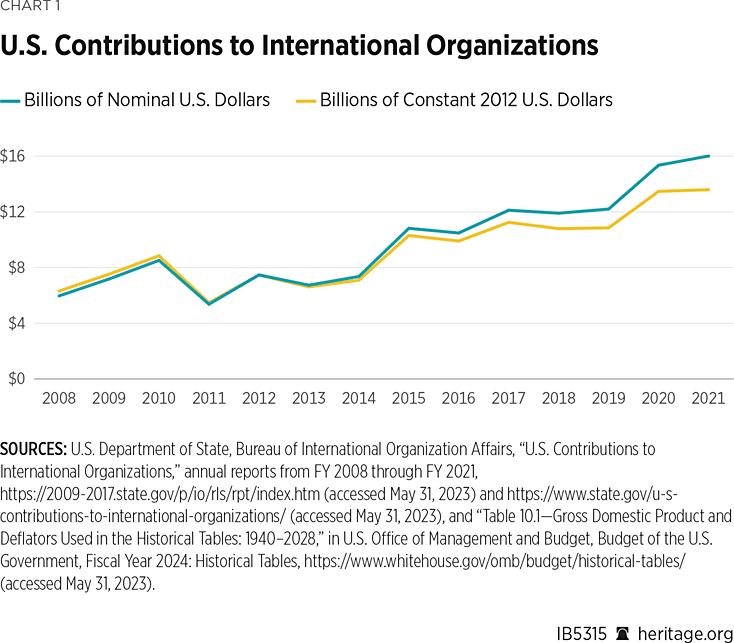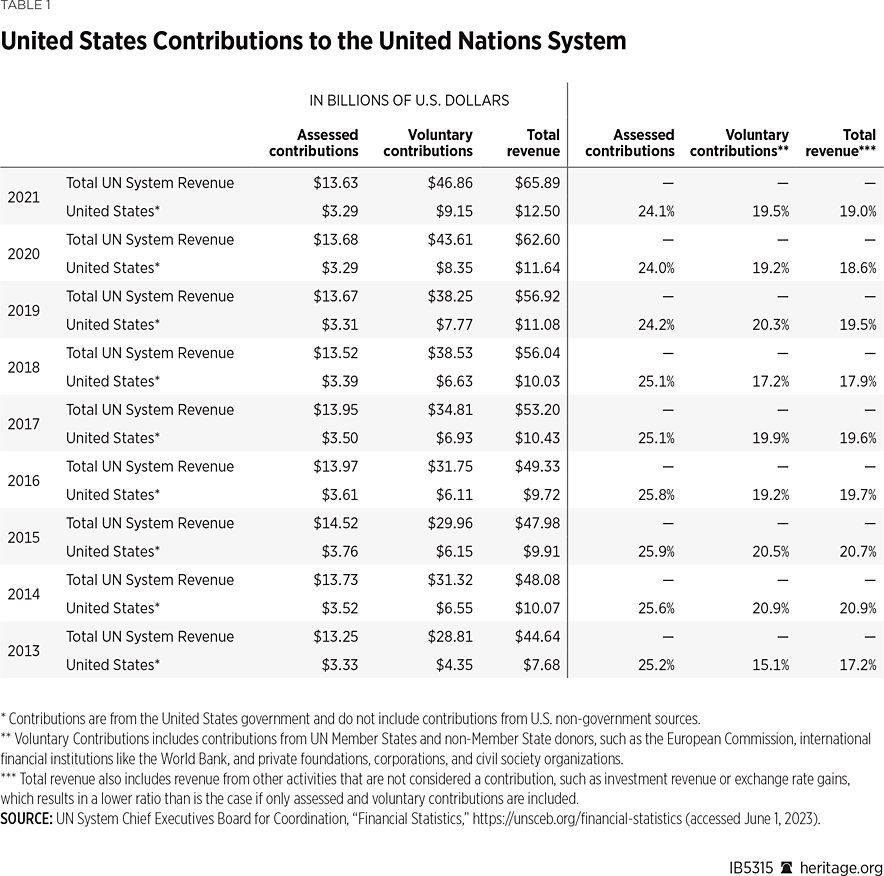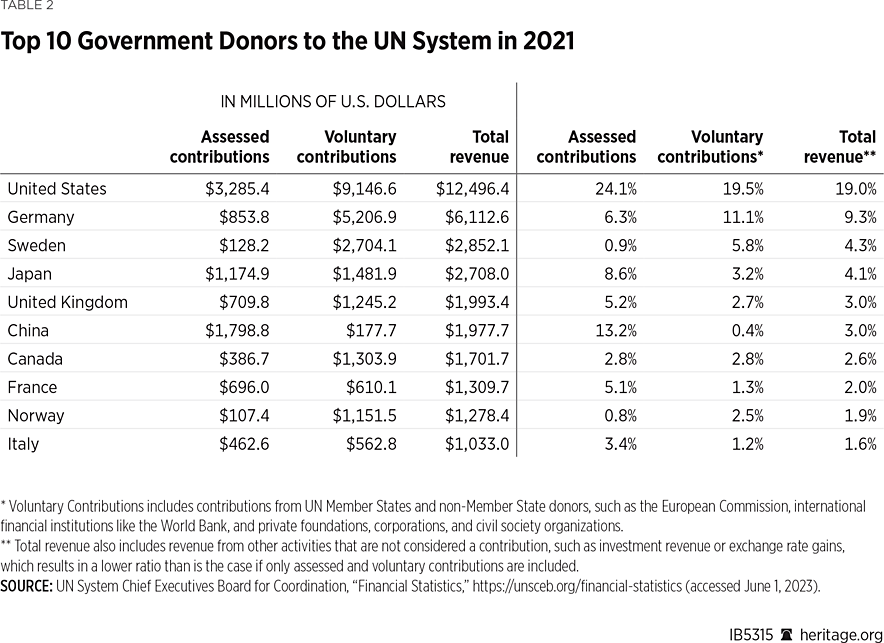The United States provides billions of dollars each year to the United Nations and other international organizations. The past decade has seen these contributions rise sharply, doubling in size from fiscal year (FY) 2012 to FY 2021. The State Department reports that since FY 2008, the U.S. has contributed more than $137 billion to international organizations—most of which has gone to the U.N. system. In fact, the United States contributed more in 2021 than the combined contributions of 178 of the 193 U.N. member states.REF
Because the U.S. has limited ability to oversee how these funds are used, it is compelled to rely on the organizations to hold themselves accountable. In the past, Congress has leveraged America’s huge financial contributions to force reform, and it should continue to use this leverage.REF
However, the sheer size of these contributions should lead the U.S. to demand greater access to ensure that U.S. funding is used as intended and periodically assess both whether these contributions are allocated so that they advance U.S. interests and whether U.S. membership is merited.REF Specifically, Congress should require the Department of State to conduct a periodic cost-benefit analysis of U.S. contributions to and membership in all international organizations, demand adequate transparency and accountability standards, and require the necessary access to ensure appropriate U.S. oversight.
Rising Tide of U.S. Contributions
The United States has provided financial support to various international organizations for decades—in some cases, as far back as the 1800s. As illustrated in Chart 1, U.S. contributions have increased sharply over the past decade. According to the most recent data, the U.S. provided more than $16 billion in funding to nearly 200 regional and multilateral international organizations in FY 2021 alone.REF

Until relatively recently, the U.S. did a poor job of tracking the amounts of funding provided to these organizations. The first effort to get an authoritative figure for these contributions was led by Senator Tom Coburn (R–OK), who in a 2006 letter to former Office of Management and Budget (OMB) director Rob Portman requested a comprehensive report on total U.S. contributions to the U.N. system for FY 2001–FY 2005.REF This one-off report highlighted the inexact nature of U.S. oversight and revealed that previous State Department reports greatly underestimated the amount of U.S. contributions.REF
To provide a full picture of U.S. contributions to international organizations, Congress enacted legislation requiring the Administration to report annually on U.S. contributions to the U.N. and other international organizations. The comprehensiveness of the reports varied, especially in the early years, but the data provided in reports since FY 2008 are comparable.
These reports show that between FY 2008 and FY 2021, the U.S. contributed more than $137 billion to international organizations.REF As illustrated in Chart 1, this period saw two separate surges in funding:
- From FY 2008 to FY 2014, U.S. contributions averaged just under $7 billion per year or, after adjusting for inflation, just over $7 billion per year.
- From FY 2015 to FY 2019, U.S. contributions averaged $11.5 billion per year or, after adjusting for inflation, just over $10.6 billion per year.
- In FY 2020 and FY 2021, U.S. contributions shot up to $15.4 billion and $16 billion, respectively, or, after adjusting for inflation, just over $13.5 billion per year.REF
Notably, these increases occurred as the U.N. peacekeeping budget, which accounts for a major portion of U.S. contributions, declined from a peak of $8.5 billion in 2014/2015 to $6.6 billion in 2021/2022.REF
Higher contributions starting in FY 2015 were tied primarily to increased funding for several international organizations, including the World Food Program (WFP) and the International Committee of the Red Cross, addressing major humanitarian and refugee crises in places like the Central African Republic, Syria, and Venezuela.
Increased funding since FY 2019 has gone primarily to the Global Fund to Fight AIDS, Tuberculosis, and Malaria; the WFP and UNICEF; and the Office of the United Nations High Commissioner for Refugees (UNHCR). In addition, there were substantial payments to the World Health Organization and the United Nations Relief and Works Agency for Palestine Refugees (UNRWA) after the Biden Administration reversed Trump Administration decisions to end U.S. funding of those organizations.
U.N. System Claims the Largest Share
The U.S. has been the largest financial supporter of the U.N. and its affiliated organizations since the U.N.’s founding in 1945. The largest share of U.S. contributions to international organizations goes to the United Nations and its affiliated specialized agencies, funds, and programs. Specifically, based on U.S. and U.N. System Chief Executives Board for Coordination (UNCEB) data, over three-quarters of U.S. contributions to international organizations goes to organizations in the U.N. system each year.REF
The U.N. data allow analysis of U.S. contributions in the context of overall U.N. revenues and comparison with contributions from other governments. As illustrated in Table 1, across the U.N. system, the U.S. provides about a fifth of total revenues received. This includes approximately a quarter of all assessed contributions and voluntary contributions provided by governments. When private voluntary contributions are included, the U.S. government provides about a fifth of all voluntary contributions.

This is by far the highest level of contributions from any government. According to the UNCEB, since 2013, the U.S. has provided two to three times more total funding to the U.N. system than the second highest government donor. The U.S. contributed six times more to the U.N. system than China contributed, largely because its voluntary contributions (i.e., those it is not obligated to pay) dwarfed those from China, whose contributions fail to reflect its status as the world’s second largest economy.REF

As illustrated in Table 2, in 2021, China ranked sixth behind the U.S., Germany, Sweden, Japan, and the United Kingdom. Moreover, while China’s contributions have increased over the past decade, this is due principally to increased assessed contributions linked to its economic growth. China’s voluntary contributions are a small fraction of those provided by other major donors and have never exceeded more than 1 percent of voluntary contributions provided to the U.N. system in any one year. In fact, according to the UNCEB, China ranked behind Ethiopia and Pakistan in 2021 voluntary contributions.REF
Growing Contributions Demand More Oversight
On an annual basis, U.S. contributions to international organizations have exceeded the budgets of dozens of U.S. government entities. For instance, in FY 2021, the WFP, UNHCR, and Global Fund all received more funding from the U.S. government ($3.2 billion, $1.9 billion, and $1.5 billion, respectively) than the Executive Office of the President of the United States ($1.49 billion).REF
U.S. government agencies are subject to oversight by independent offices of inspectors general and robust protections for those who blow the whistle on mismanagement, malfeasance, or misconduct. In contrast, the United States’ ability to maintain direct oversight of its large contributions to international organizations has been limited mostly to those U.N. governing bodies on which the U.S. is a member. As demonstrated by the recent management scandal at the U.N. Office for Project Services,REF oversight by governing bodies is not always sufficient to detect and prevent mismanagement and fraud.
The U.S. has demanded better internal oversight from international organizations. For instance, evidence of mismanagement and fraud led the Congress to withhold funding from the U.N. regular budget in the early 1990s until the U.N. General Assembly created an inspector general. As a direct response, the Office of Internal Oversight Services (OIOS) was created in 1994 as the U.N.’s primary investigative and auditing unit. However, these internal U.N. oversight mechanisms generally lack independence, with senior staff subject to evaluations by and reporting to the organization they are charged with holding accountable.REF
Whistleblowers often are responsible for revealing mismanagement, abuse, and other malfeasance in international organizations, but they frequently face retaliation.REF For nearly a decade, the U.S. has required the Secretary of State to report on whether international organizations are meeting specified transparency and accountability standards, including “effectively implementing and enforcing policies and procedures which meet or exceed best practices in the United States for the protection of whistleblowers.”REF However, willingness to use this reporting mechanism objectively and withhold funds has been inconsistent. For instance, despite complaints of retaliation by whistleblowers in the U.N. system,REF the U.S. has very rarely reported international organizations as failing to meet these standards, and Congress has reduced or removed the withholding requirement in recent years, including in FY 2023.REF
What Congress Should Do
Regardless of mission and reputation, the U.S. government has a responsibility to oversee contributions to international organizations on behalf of the U.S. taxpayer to ensure that they are used effectively, efficiently, and as intended. This responsibility becomes more serious as U.S. contributions rise. To improve U.S. oversight, Congress should:
- Condition U.S. funding on U.S. oversight. Given the rapid increase in U.S. contributions to international organizations, which comprise a significant share of the State Department budget, the value of enhanced U.S. oversight is obvious. Historically, the U.N. has resisted such oversight, but it has cooperated with the U.S. Government Accountability Office (GAO) on projects like the renovation of the U.N. headquarters building in New York (the Capital Master Plan).REF Congress should make U.S. contributions to international organizations subject to accessibility to data and other relevant information by the Offices of Inspector General of the Department of State and the United States Agency for International Development and the GAO.
- Demand that the State Department conduct a cost-benefit analysis of U.S. participation. Although many international organizations provide important contributions to U.S. diplomatic, economic, and security interests, not all do. Congress should require the State Department periodically (at least once every four years) to assess the value to U.S. interests of membership in and contributions to international organizations. This analysis should inform future contributions.
- Withhold funding for international organizations that lack adequate whistleblower protections. Congress should reimpose the mandated 15 percent withholding for “Transparency and Accountability” in international organizations and insist on rigorous application of the specified transparency and accountability standards.
Conclusion
Congress and the Administration, as stewards of U.S. taxpayer dollars, have a responsibility to ensure that U.S. contributions to the U.N. system and other international organizations are used as intended. To ensure that these contributions serve U.S. interests, Congress should require the Department of State to conduct a periodic cost-benefit analysis of U.S. contributions and membership in all international organizations, demand adequate transparency and accountability standards, and require access to documents, financial statements, and other records that are necessary to ensure appropriate U.S. oversight.
Brett D. Schaefer is Jay Kingham Senior Research Fellow in International Regulatory Affairs in the Margaret Thatcher Center for Freedom at The Heritage Foundation.


